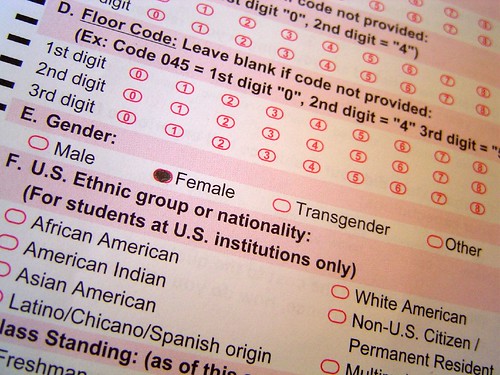 |
| Photo by Robyn Lee. Used under creative commons |
Demographics questions/items:
“survey questions that inquire about respondents’ personal characteristics, such as name, age, gender, education”(FBFK).
What demographic questions do you ask?
Only ask demographics that will help you interpret results. Careful with long surveys. Why?
Once you are finished with your demographic questions, next you need to ask questions that help you answer your specific research question(s). You need to ask questions that measure your independent and dependent variables.
What are the general types of questions (or “items”) that can appear on a survey?
- Knowledge items
- Attitude items
- Behavior items
If you were writing a survey on social media use, what would be some examples questions/items you may put on your survey? Knowledge? Attitude? Behavior?
Do you just have your respondents choose among some predetermined choices or do you leave them some space to respond in whatever why they choose? Put another way, what are close-ended and open-ended survey questions?
- Closed-ended items
- Scales-- e.g., Likert scale
- Use stats to analyze responses to each item and stats to summarize findings
- Open-ended items
- Words-- Transcribe responses and use textual analysis to summarize findings
Once you have finished a draft of your survey questions, you'll need to go back and proof-read. As you are checking spelling and grammar, also keep the following in mind.
What are some tips on wording survey items?
- Keep items short.
- Avoid loading or leading questions.
- “Don’t you think rich professors should be denied a pay raise?”
- Avoid double-barreled wording.
- “I support family values and prayer in school.”
- Avoid double negatives.
- “Do you never avoid conflict?”
Share this post with others. See the Twitter, Facebook and other buttons below.
Please follow, add, friend or subscribe to help support this blog.
See more about me at my web site WilliamHartPhD.com.
No comments:
Post a Comment
Thank you for your comment.
Your comment will be reviewed.
If acceptable, it will be posted after it is carefully reviewed. The review process may take a few minutes or maybe a day or two.